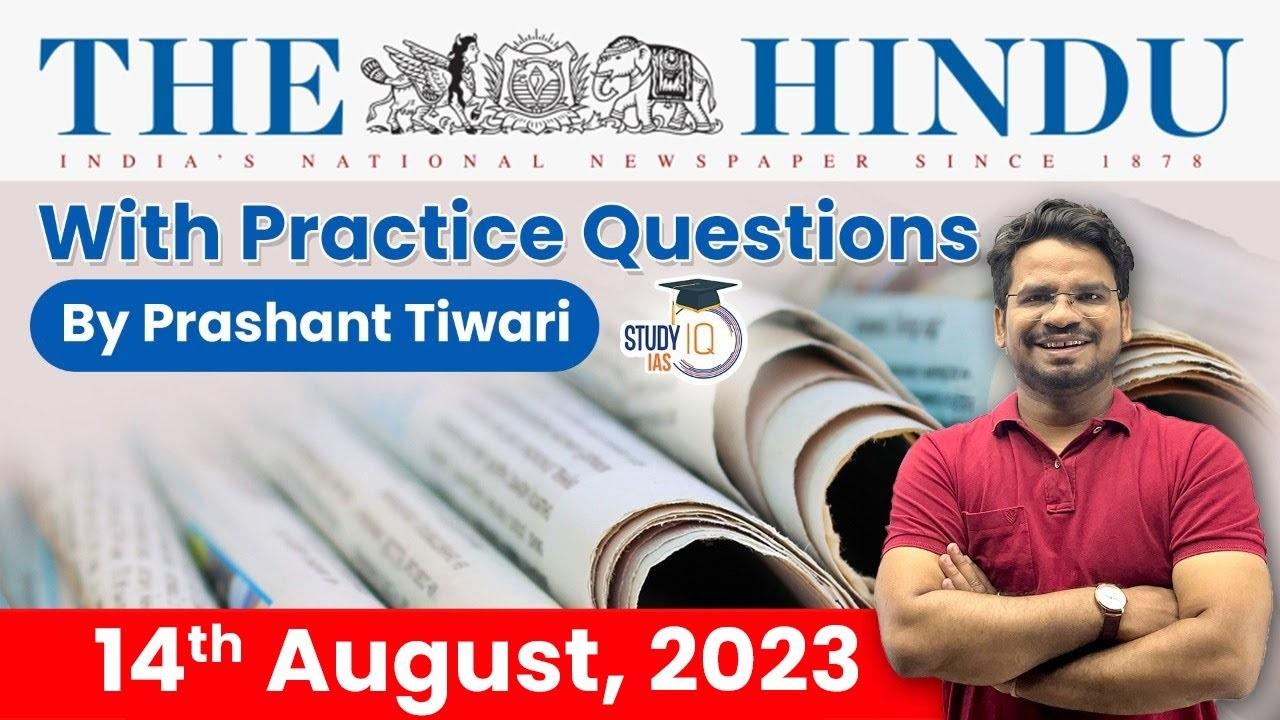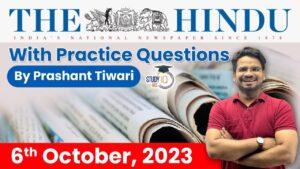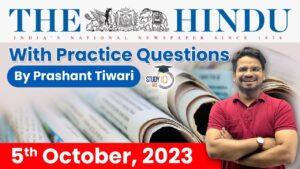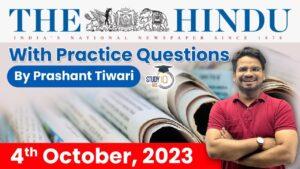The Hindu Newspaper Analysis for UPSC

The Hindu Newspaper Analysis 12 August 2023
- Amid reports that the bureaucracy and the police are split on ethnic lines in Manipur, the State government has asked officials to quit formal and informal groups on social media platforms that further “separatist, anti-national, communal and divisive agendas”.
- The government has sought a compliance report from all its departments.
- It warned that being a member of such groups is “in contravention of Rules 5 and 7 or both of All India Services (Conduct) Rules, 1968, and Rules 5, 9, and 11 or all three of Central Civil Services (Conduct) Rules, 1964”, and such members are liable to face disciplinary action.

- Kerala, Tamil Nadu, and West Bengal are among the 14 States and Union Territories which are yet to sign a crucial memorandum of understanding (MoU) with the Union Education Ministry, which mandates the implementation of the National Education Policy, 2020 to get funds of almost ₹13,000 crore for the next three years under the Centre’s flagship scheme for State-run higher education institutions.
- Rashtriya Uchchatar Shiksha Abhiyan (RUSA) was a Centrally Sponsored Scheme to fund States/UTs institutions, with the vision to attain higher levels of access, equity, and excellence in the State higher education system with greater efficiency, transparency, accountability, and responsiveness.
- The first phase of the scheme was launched in 2013 and the second phase was launched in 2018. Now, in the light of the National Education Policy, RUSA scheme has been launched as Pradhan Mantri Uchchatar Shiksha Abhiyan (PM-USHA).

- Last year, the Union Government constituted a commission, headed by the former Chief Justice of India, K.G. Balakrishnan, to study the possibility of granting Scheduled Caste (SC) status to Dalit Christians.
- The Justice Ranganath Misra Commission (2007) recommended ‘permitting Dalits who converted to Christianity to avail of reservation benefits under the SC quota’.
- The findings arrived at by Deshpande and Bapna (2008) appointed by the National Commission of Minorities, stated that ‘there is no compelling evidence to justify denying them of SC status’.
Who is Included in the Constitution Order of 1950?
- When enacted, the Constitution (Scheduled Castes) Order of 1950, initially provided for recognizing only Hindus as SCs, to address the social disability arising out of the practice of untouchability. However, the order also provided that every member of Ramdasi, Kabirpanthi, Mazhabi, or Sikligar caste resident in Punjab or the Patiala and East Punjab, be deemed to be a member of the Scheduled Castes whether he professes the Hindu or Sikh religion.
- The Order was amended in 1956 to include Dalits who had converted to Sikhism (in entirety) and once more in 1990 to include Dalits who had converted to Buddhism.
- Both amendments were aided by the reports of the Kaka Kalelkar Commission in 1955 and the High-Powered Panel (HPP) on Minorities, Scheduled Castes, and Scheduled Tribes in 1983 respectively.
- The 1950 Order (post amendments in 1956 and 1990), mandates that anybody who is not a Hindu, Sikh or Buddhist cannot be granted SC status.

- A Bill introduced in the Rajya Sabha says the committee will consist of the Prime Minister, the Leader of the Opposition and a Union Cabinet Minister.
- This runs counter to a recent judgment of a Constitution Bench that envisaged an independent selection committee that included the Chief Justice of India.
- The judgment was also in line with the recommendations of the Dinesh Goswami Committee in 1990 and the Justice Tarkunde Committee in 1975.
- It is true that the Court said that its order would hold good only until Parliament made a law as envisaged in the Constitution.
- The independent V-Dem Institute in Sweden, which compares democracies worldwide, has downgraded India to an “electoral autocracy”, citing the loss in autonomy of the ECI.
- A non-partisan and independent ECI is a sine qua non for the robustness of electoral democracy.
- The Election Commission of India has played a seminal role in the periodic conduct of elections, which have only seen greater participation from the electorate because of the largely free, fair and convenient nature of the process.



- India and China are set to hold the 19th round of Corps Commander talks on Monday at Chushul as part of the ongoing efforts to resolve the stand-off in eastern Ladakh, defence sources said. The talks come less than a month ahead of the G-20 Leaders’ Summit in New Delhi. Chinese President Xi Jinping is expected to attend the summit in person.
- “The Indian stance has been consistent, that is restoration of status quo ante as on April 2020, and the focus would be on disengagement from Depsang and Demchok. The above entails restoration of patrolling rights till the traditional patrolling points,” a defence source said.
- Ahead of the G-20 Summit in New Delhi on September 9 and 10, Prime Minister Narendra Modi and Mr. Xi are scheduled to attend the BRICS Summit in Johannesburg from August 22 to 24. While there has been no confirmation of a bilateral meeting, there has been no denial either.
- The two leaders have not had formal bilateral talks since November 2019, when they met on the sidelines of the BRICS Summit in Brazil, but they did briefly exchange words when Mr. Modi approached Mr. Xi at a dinner during the G-20 Summit in Bali, Indonesia, in November 2022.

- The Punjab and Haryana High Court made a rare interference by taking judicial notice suo motu and stayed the demolition drive.
- The High Court took cognisance of the fact that the demolition drive was carried out without “demolition orders and notices”, thereby violative of the procedure established by law.
- Article 21 of Indian Constitution commands that no person shall be deprived of his life and personal liberty except according to the procedure established by law.
- In the Maneka Gandhi case (1978), the Supreme Court had expanded the scope of procedure established by law by ruling that such procedure has to be “fair, just and reasonable, not fanciful, oppressive or arbitrary”, thereby introducing the principle of “procedural due process”. Despite such an expansion of the scope of Article 21, it is a constitutional travesty that scant regard for such basic principles is demonstrated by elected governments.
- While the rule of law is declared a basic feature of the Constitution, rule by law is the antithesis of all that is represented by rule of law. The rule of law is a government run by law, not men.
- Rule by law is when the law is used as an instrument of suppression, oppression and social control in the course of implementing a political agenda.
- “Justice must never take the form of revenge”, recited the then Chief Justice S. A. Bobde in 2019, in a different context when police allegedly took law into their hand and shot dead the accused.


 The Hindu Newspaper Analysis 6 October 2...
The Hindu Newspaper Analysis 6 October 2...
 The Hindu Newspaper Analysis 5 October 2...
The Hindu Newspaper Analysis 5 October 2...
 The Hindu Newspaper Analysis 4 October 2...
The Hindu Newspaper Analysis 4 October 2...

















